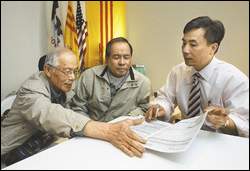|
|
Health Fair Offers Asians Remedy for Language Barrier in Medicine
Dana Boone, Des Moines Register
May 13, 2006

Dai Ngo, left, 80, a retiree from Des Moines, must rely on friends to help him interpret paperwork so he can get other health care. With Ngo is Hai Le, center, 66, another retiree, and Vinh Nguyen, the director of the Des Moines school districtís English Language Learner program. (Mary Chind, The Register)
Bilingual offerings at Des Moines festival today intended to help Iowans find care
Imagine trying to tell a nurse or a doctor how sick you are, but she can't understand you because she doesn't speak the same language.
Imagine being asked to complete lengthy medical forms in English, but you understand few English words.
Or having to tell another patient your medical history because he happens to be the only person around who speaks Vietnamese.
Des Moines retirees Hai Le, 66, Dai Ngo, 80 and other Asian-Americans said they have faced these and other barriers to health care.
Asian groups and the health care industry are hoping to change that. One step towards that solution is a health and wellness fair at this weekend's Iowa Asian Heritage Festival in Des Moines.
Festival-goers today will have bilingual access to a wide range of health services sponsored by Wellmark Blue Cross and Blue Shield during the festival.
They can get their vision, hearing, cholesterol, blood pressure or body mass index checked. Men can also take a finger prick test to check their prostates.
Printed health information will also be available in a wide variety of languages, and bilingual health care providers will also be available.
Language isn't the only problem. There also are cultural barriers that keep Asians from getting health care services.
"Usually we don't go to see the doctors until we get sick," said Cyndi Chen, chairwoman of the Commission on the Status of Iowans of Asian and Pacific Islander Heritage.
A University of Northern Iowa report about the health disparities in Iowa found that language is a "significant limitation" Asians face in getting the health care they need.
Le, who came to the United States from Vietnam in 1972, said he has acted as an impromptu interpreter for other elderly Asians while at his own medical appointments.
"It's difficult because I don't get every word," Le said through Vinh Nguyen, director of the Des Moines school district's English Language Learner program.
Iowa's population of 43,119 Asians, or 1.5 percent of the state's population, is expected to nearly triple by 2030, according to the U.S. Census Bureau.
"Health care providers need to learn more about Asian cultures," Chen said.
More than half of the 7 million Asians in the nation rated their ability to speak English as worse than "very well," according to the 2000 census.
In Iowa, about 5.8 percent of Iowans, or 160,022 people, speak a language other than English at home. About 2.5 percent, or 68,108 people, reported they spoke English worse than "very well," according to the census.
Chen said little data exists on the health concerns of Asians in Iowa.
"We don't have data available that's Asian specific," Chen said. "Actually, we don't know much about it. This issue has never been addressed."
A report from the Association of Asian Pacific Community Health Organizations said that Iowa has a lack of medical interpreters.
Asians are "afraid to go to the doctor because there is no one to interpret," said Kim Nguyen, a Des Moines teacher, who takes elderly residents to visit the doctor.
For Asians to have better health, they need access to transportation and health insurance coverage, Asian clinics, and interpreters who speak Asian languages, said Vannavong Phabmixay, a refugee specialist with the Iowa Department of Public Health.
Many Asians need help navigating the U.S. health care system. The refugees he works with don't always understand how to take medicine and get their questions answered, he said. Others use folk or herbal medicines or folk remedies and are skeptical about doctors, he said.
"They don't take the medicine until they get sick and they're coughing up blood," Phabmixay said.
Cang Pham, president of the Vietnamese American Community in Iowa, agreed: "If someone has cancer, they don't talk about it."
Melanie Vaccaro, a lead volunteer on health and wellness issues for the Iowa Asian Alliance, said Asians hesitate to take time off work or from caring for their families to care for their own health.
Vaccaro, who is Japanese, said health education is a necessity in the growing Asian communities. "The goal is to help Asians begin to become more proactive about their health," she said. "It really is a community approach to health and wellness."
|
|



